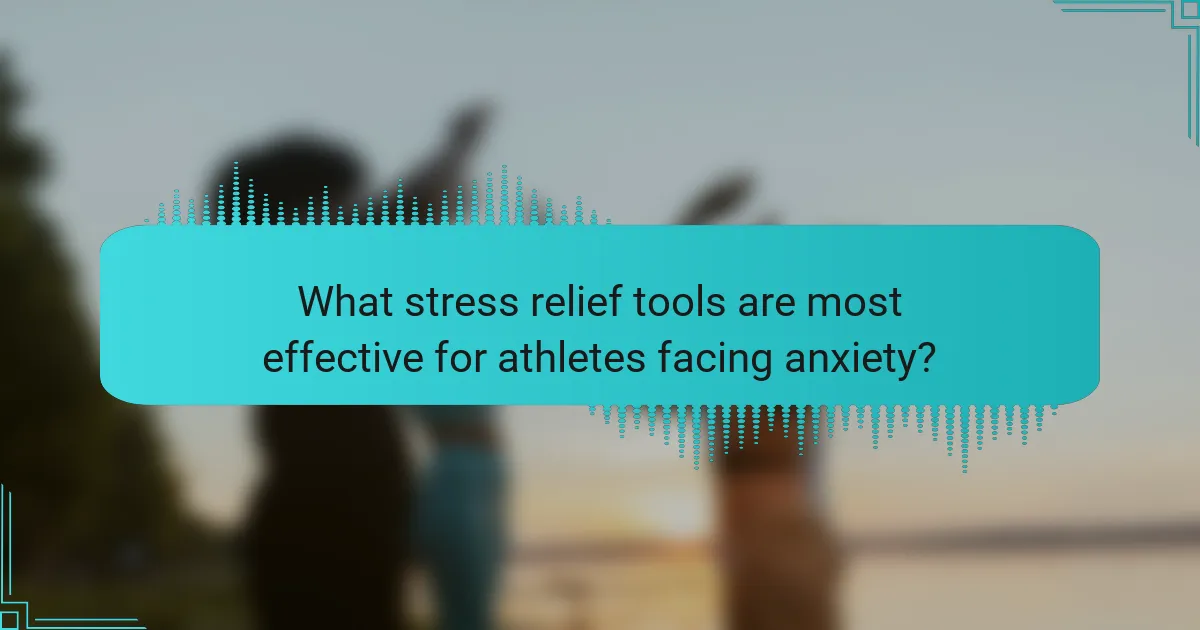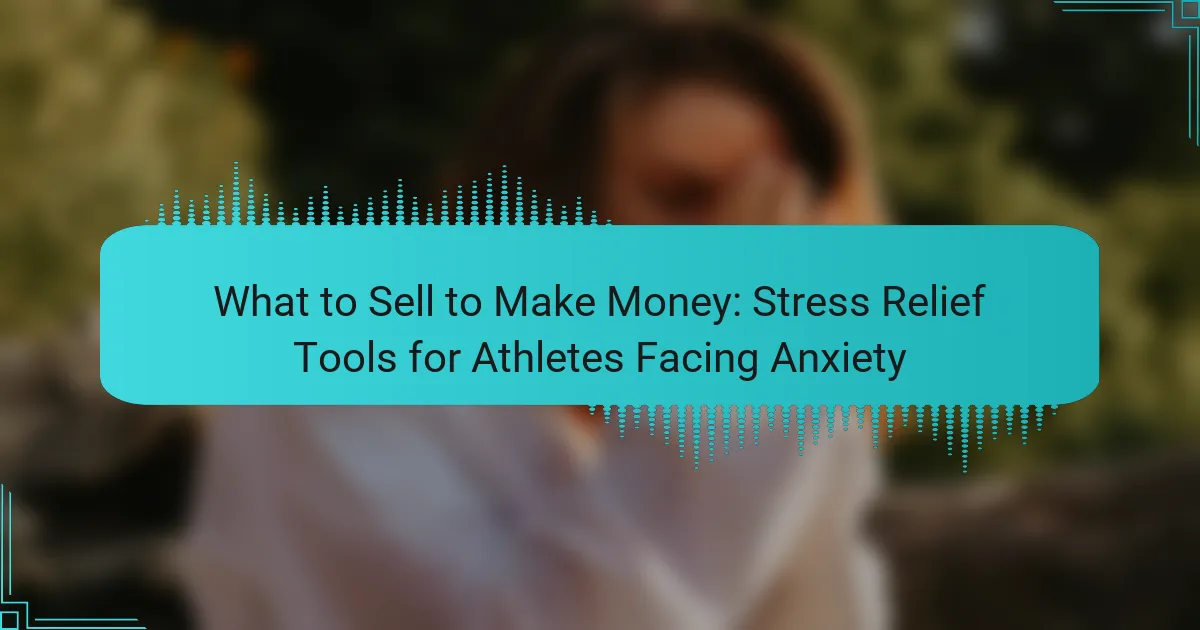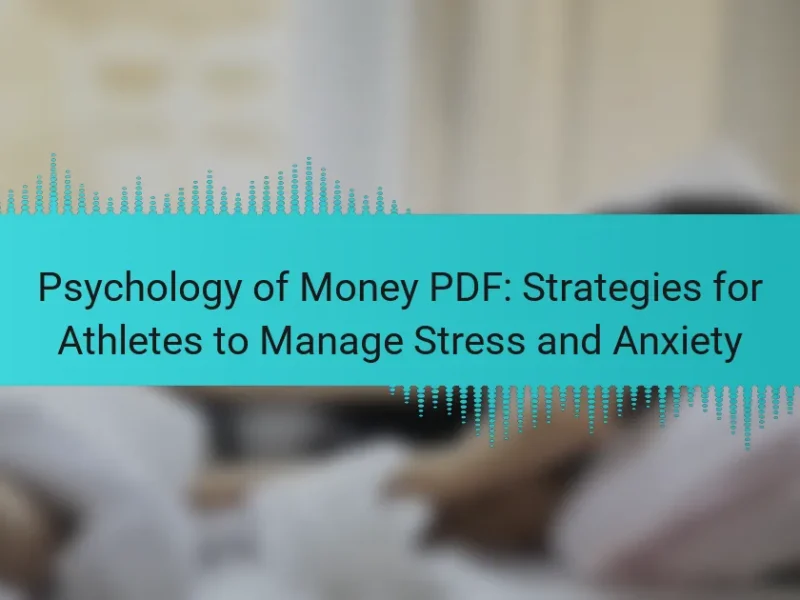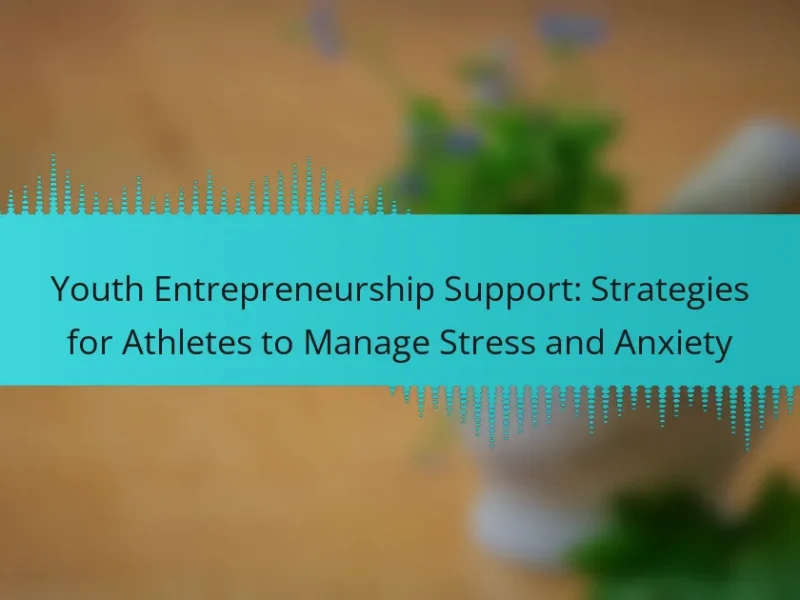Athletes often face anxiety that can hinder performance. Mindfulness techniques enhance focus, while biofeedback devices provide real-time stress management. Stress management apps offer guided exercises to support mental well-being. Together, these stress relief tools can significantly improve athletes’ performance and resilience.

What stress relief tools are most effective for athletes facing anxiety?
Mindfulness techniques, biofeedback devices, and stress management apps are effective stress relief tools for athletes facing anxiety. Mindfulness practices enhance focus and reduce anxiety levels. Biofeedback devices provide real-time data on physiological responses, helping athletes manage stress. Stress management apps offer guided exercises and tracking features to support mental well-being. These tools collectively improve performance and mental resilience.
How do stress relief tools impact athletic performance?
Stress relief tools significantly enhance athletic performance by reducing anxiety. These tools, such as mindfulness apps and breathing exercises, improve focus and recovery. Athletes using stress relief methods report better concentration and reduced performance anxiety, leading to improved results. Research shows that regular use of these tools can increase endurance and overall performance metrics.
What are the most common types of stress relief tools available?
Stress relief tools for athletes facing anxiety include various types designed to enhance mental well-being. Common types are mindfulness apps, stress balls, meditation cushions, aromatherapy diffusers, and wearable stress monitors. These tools offer unique benefits, such as promoting relaxation, improving focus, and providing real-time feedback on stress levels. Athletes can choose tools based on their specific needs, preferences, and the unique attributes of each tool.
What are the core features of relaxation techniques?
Relaxation techniques primarily focus on reducing stress and anxiety. Core features include deep breathing exercises, progressive muscle relaxation, meditation, visualization, and mindfulness practices. These methods enhance mental clarity, improve emotional regulation, and promote physical well-being. Each technique can be tailored to individual preferences, making them versatile tools for athletes facing anxiety.
How do wearable devices help in managing stress?
Wearable devices help manage stress by providing real-time data on physiological responses. They monitor heart rate variability, sleep patterns, and activity levels, enabling athletes to identify stress triggers. These insights allow for personalized stress management strategies, enhancing mental resilience. Features like guided breathing exercises and mindfulness reminders further support stress relief, making them essential tools for athletes facing anxiety.
Which unique stress relief tools cater specifically to athletes?
Athletes can benefit from unique stress relief tools designed to address their specific needs. These tools include massage guns, foam rollers, mindfulness apps, breathing techniques, and guided visualization programs. Each tool targets stress relief and enhances performance, making them essential for athletes facing anxiety.
What role do mental conditioning programs play?
Mental conditioning programs significantly enhance athletes’ mental resilience, reducing anxiety and improving performance. These programs focus on techniques like visualization, mindfulness, and positive self-talk, which help athletes manage stress effectively. By incorporating mental conditioning, athletes can better cope with competitive pressures, leading to improved focus and confidence during events. This unique attribute of mental conditioning directly contributes to enhanced overall performance and well-being.
How can specialized breathing exercises improve focus?
Specialized breathing exercises enhance focus by reducing anxiety and promoting relaxation. These techniques encourage deeper oxygen intake, which optimizes brain function and mental clarity. Athletes can benefit from improved concentration during performance, leading to better outcomes. Research indicates that consistent practice of these exercises can significantly lower stress levels, enhancing overall athletic performance.
What rare stress relief tools have emerged in recent years?
Innovative stress relief tools for athletes have emerged, focusing on unique attributes. One rare tool is biofeedback devices, which help track physiological responses to stress, allowing athletes to manage anxiety effectively. Another is sensory deprivation tanks, providing an immersive environment that promotes relaxation and mental clarity. Additionally, virtual reality meditation apps offer guided experiences that cater to individual needs, making stress relief more accessible. These tools highlight a growing trend towards personalized mental wellness solutions in sports.
What are the benefits of using biofeedback devices?
Biofeedback devices offer numerous benefits for athletes facing anxiety, including improved self-regulation, enhanced focus, and reduced stress levels. These tools provide real-time feedback on physiological functions, allowing users to understand and manage their body’s responses. As a result, athletes can experience increased performance and recovery. Studies show that consistent use can lead to a significant reduction in anxiety symptoms and improved overall well-being.
How do virtual reality environments assist in anxiety management?
Virtual reality environments assist in anxiety management by providing immersive experiences that promote relaxation and focus. These environments simulate calming scenarios, allowing athletes to practice mindfulness and reduce stress. Research indicates that virtual reality can lower cortisol levels, enhancing emotional regulation. Additionally, athletes can engage in exposure therapy through controlled virtual settings, gradually facing anxiety-inducing situations. This unique attribute of VR technology offers a novel approach to stress relief, making it an effective tool for athletes dealing with anxiety.
How can athletes monetize stress relief tools?
Athletes can monetize stress relief tools by selling products like mindfulness apps, yoga classes, or relaxation gadgets. These tools address anxiety and enhance performance, appealing to a broad audience. Unique attributes, such as personalized coaching or innovative technology, can differentiate offerings. As a result, athletes can create additional income streams while promoting mental well-being.
What are the best practices for marketing stress relief products?
To effectively market stress relief tools for athletes facing anxiety, focus on targeted strategies. Highlight unique attributes like portability and ease of use. Utilize social media platforms to engage with athletes, showcasing testimonials and success stories. Implement educational content that explains the benefits of different tools, such as mindfulness apps or relaxation gadgets. Collaborate with fitness influencers to reach a broader audience and enhance credibility. Offer promotions or bundles to encourage trial and repeat purchases.
What common mistakes should be avoided when selling stress relief tools?
To successfully sell stress relief tools for athletes facing anxiety, avoid common mistakes such as neglecting market research, underestimating the importance of quality, and failing to provide clear benefits. Many sellers overlook the unique attributes that resonate with athletes, such as durability and effectiveness. Mispricing products can also deter potential buyers; ensure pricing reflects value and quality. Lastly, inadequate marketing strategies can limit visibility; utilize targeted campaigns to reach your audience effectively.
How can athletes create a personalized stress management plan?
Athletes can create a personalized stress management plan by identifying specific stressors and incorporating tailored stress relief tools. Start with self-assessment to pinpoint anxiety triggers. Next, integrate techniques such as mindfulness, breathing exercises, and physical activity into daily routines. Regularly evaluate the effectiveness of these strategies to ensure they meet individual needs. Additionally, consider professional support, such as sports psychologists, for personalized guidance.
What steps should be taken to evaluate stress relief tool effectiveness?
To evaluate the effectiveness of stress relief tools for athletes facing anxiety, follow these steps. First, define clear metrics for success, such as reduction in anxiety levels or improved performance. Next, conduct controlled trials comparing the tool’s impact against a control group. Gather qualitative feedback from users to assess personal experiences. Finally, analyze data for trends and correlations to determine overall effectiveness and areas for improvement.


